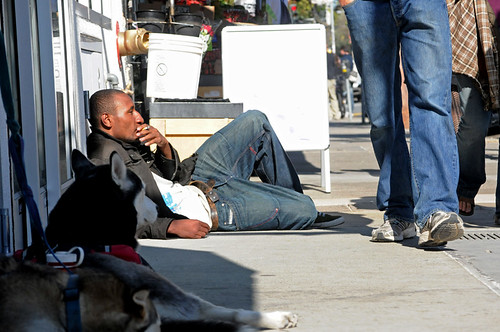
Morgan, who goes by the self-styled last name of “Dirty Rotten Pole Cat,” was born the son of a schoolteacher. In adulthood, he pursued formal training to be a cook, but luck turned on him and he had to brace himself on the street.
As Morgan rested his knees on the corner of Masonic and Haight streets for half an hour April 8, two policemen approached him, issuing a citation because he violated the much-protested sit/lie law. Squatting against the wall, he stood up to sign his ticket and retrieve his ID.
“I’m not drunk,” he insisted.
“Take off, Morgan,” one of the policeman said, ordering him to move along.
Wrapped in an over-sized green jacket, Morgan trudged away, leaving his sitting spot.
Four months after being approved by voters, the so-called sit-lie ordinance, which prohibits sitting or lying on public sidewalks between the hours of 7 a.m. and 11 p.m., is now enforced by police officers patrolling the streets of San Francisco after an initial lag in San Francisco Police Department education about its provisions.
Some, however, still say that it may have an adverse effect on the community, especially in the Haight.
“It seems to be both redundant and very much ‘anti what the neighborhood is supposed to stand for,’” said Rick Braun, who has owned and operated the store Positively Haight Street for 18 years.
The Haight is famous for being the center of the “Summer of Love” and has long been a destination for free-spirited transplants to the city. But in recent years, more people have complained about the homeless population and street youths crowding the neighborhood, scaring tourists and new businesses away.
Many of these people are supportive of the law.
“This street needs things that are clean – as a business area, as a neighborhood – and animal excrement isn’t that,” said Michael Boul, who has worked in the Haight for 20 years.
The few weeks of enforcement, however, has not made much of a dent. Boul said he is still picking up animal excrement from dogs, which he says are the companions of so-called sit-liers.
“(They) might not sit where they normally would. But they’re around,” Boul said. “I’m still picking up fecal manure from dogs. I still notice the excrement.”
The law has also failed to bring more business to the Haight, as many supporters hoped it would.
“Things have changed for the worse in the sense that there seems be less communication and a bit more antagonism between those who want sit-lie and those who don’t want it,” said Joey Paxman, a resident of the Haight. “It cuts off the communication between the two.”
While homelessness, loiterering and narcotics are ongoing problems that need to be addressed immediately in the neighborhood, there is no magic bullet to solve all the problems, say several long-time area residents.
“We’re in the worst economic situation we’ve had since the Depression,” said Tom Alder, 60, who lived in the neighborhood since 1978. “What do you expect from people who lost their jobs and lost their housing? Where are people supposed to go?”
Some who were in favor of the law when it was first on the ballot last year have since changed their minds.
“Basically what’s been going on so far is get it out of sight, out of mind,” said Eriq Rosenberg, who works in a tattoo shop in the Haight and voted in favor of the ordinance. “You can’t sit here on the sidewalks, but they can sit at the park down the street and walk over here. It’s the same thing. It’s just pushing them away from tourists.”






